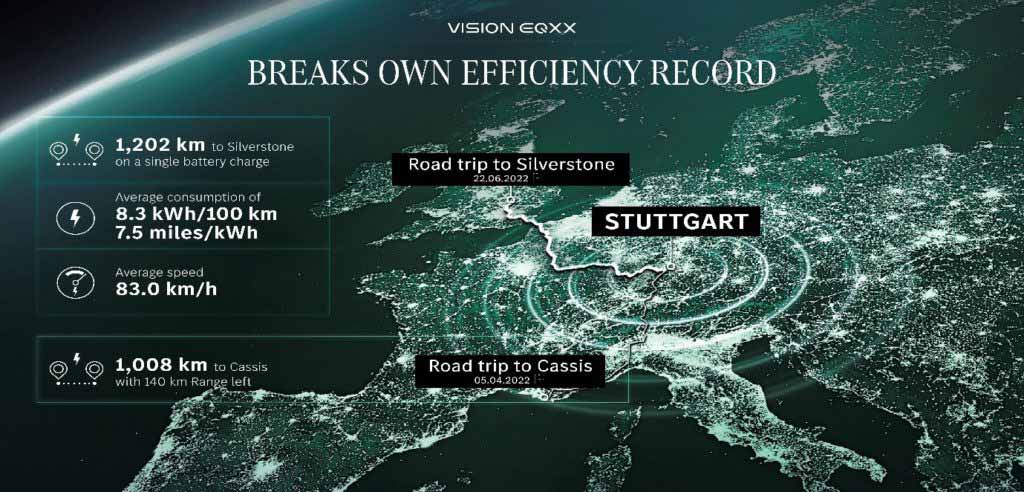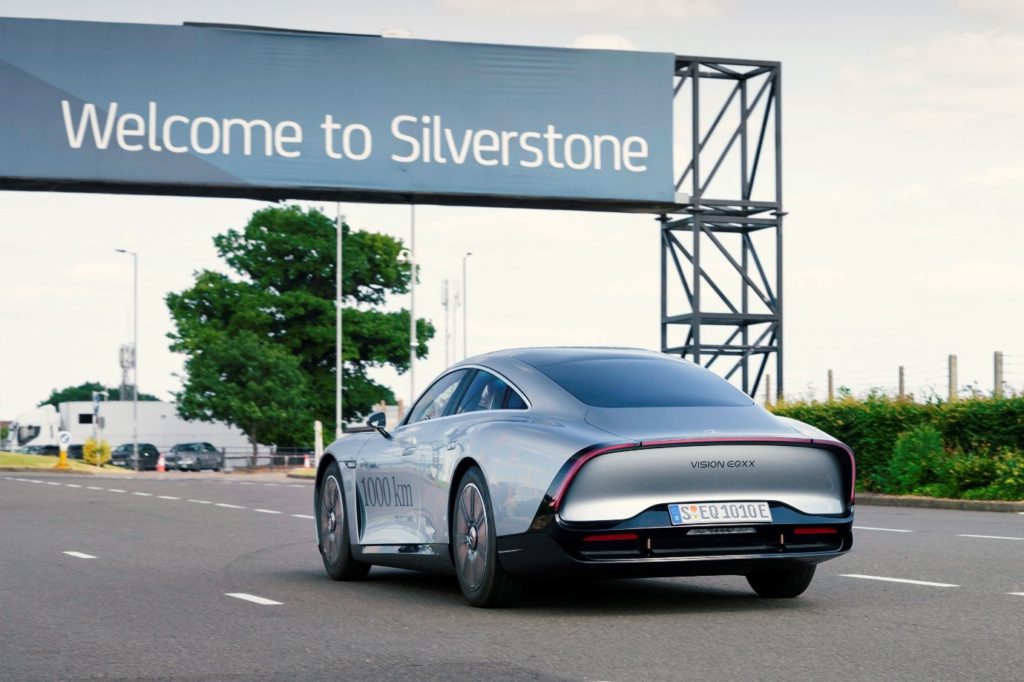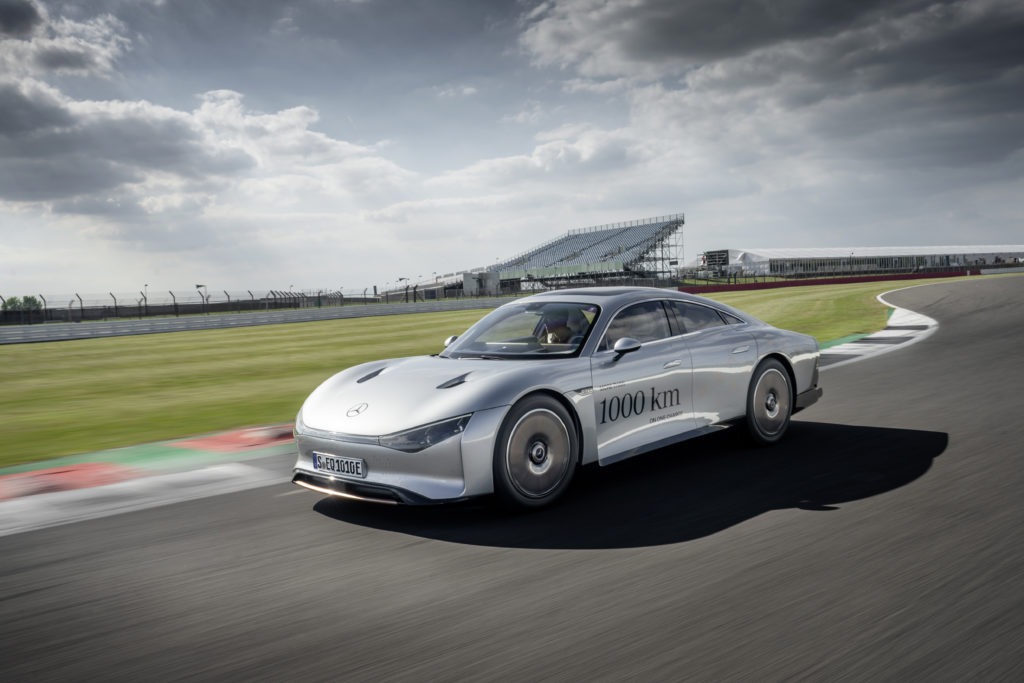Two automotive giants are pushing the ranges of their electric cars further than ever before. The ultra-efficient Mercedes-Benz Vision EQXX concept car recently completed a 1,202km journey on a single charge, travelling from the German city of Stuttgart to the UK’s Silverstone racing circuit.
Meanwhile, BMW is aiming to increase the range of its electric SUV, the iX, up to 600 miles (965km). To achieve this, the company has signed an agreement with energy-storage company Our Next Energy (ONE). As well as extending the range of the iX, ONE’s Gemini dual-chemistry battery will help reduce dependence on nickel, cobalt, lithium, and graphite.
Over 1,000km in one charge

The Vision EQXX has managed to beat its own record run of 1,008km on one charge, set in April this year, driving while from Stuttgart to Cassis on the French Mediterranean coast. Raising the bar to 1,202km with its latest road trip, the research vehicle set out to prove the effectiveness of efficiency. The battery-electric vehicle (BEV) was able to achieve average consumption of 8.3kWh/100km, even when faced with heavy traffic and high temperatures of 30 degrees Celsius.
This was thanks in no small part to the thermal-management system, which is extremely small and lightweight, as the electric drive generates minimal waste heat. Aero shutters, coolant valves, and pumps ensured an efficient temperature balance at a minimum energy cost. The Vision EQXX uses a cooling plate in the floor as well as the airflow under the BEV to stay cool.
‘Yet again, the Vision EQXX has proven that it can easily cover more than 1,000 km on a single battery charge, this time faced with a whole different set of real-world conditions,’ said Markus Schäfer, member of the board of management of Mercedes-Benz Group, chief technology officer responsible for development and procurement.
‘As Mercedes-Benz strives to go all-electric by 2030 – wherever market conditions allow – it is important to show to the world what can be achieved in real terms through a combination of cutting-edge technology, teamwork and determination,’ Schäfer added.
Past meets future

The electric car’s 1,202km journey was no mean feat. Travelling along Germany’s autobahn, across the French border near Strasbourg, down northern France to Calais, the Vision EQXX boarded the Eurotunnel. From there it journeyed around London, stopping off at the Mercedes-Benz Grand Prix headquarters in Brackley. Waiting for it there were the Formula 1 and Formula E experts who helped develop its drivetrain.
Then it was on to Silverstone, to meet Mercedes Formula E world champion Nyck de Vries. He took the car for 11 laps of the circuit, using the last of the charge on the pit lane. The racer did not go easy on the research vehicle, taking it up to its maximum speed limit of 140kph.
‘The Vision EQXX was a true pleasure to drive. I know what this team is capable of, and it was a real honour to drive such an amazing car on such a historic track,’ said de Vries, adding: ‘And I can tell you that the interior is definitely a lot more luxurious than the cockpit of a Formula E car.’
While the journey is impressive, the efficiency of the Vision EQXX stands as a testament to what is possible with a BEV. Driving for 14 and a half hours over two days, achieving an average speed of 83kph, the design of the efficient electric car illustrates what might one day be possible for mass-production models.
Greater range and sustainability
When it comes to consumer-ready electric cars, BMW’s iX entered production in July last year at its Dingolfing plant. The official WLTP range of the standard xDrive 40 version is 425km. However, with the help of ONE, the carmaker hopes to boost the iX’s range up to 965km. With a prototype vehicle expected at the end of the year, there might not be long to wait.
‘We are confident that given economic viability, this can lead to commercial opportunities and strategies to integrate ONE’s battery technologies into models of our future BEV product line-up,’ said Jürgen Hildinger, BMW Group new technologies head of high voltage storage.
But it is not just the range where ONE’s battery looks to benefit the model. Given the importance of keeping BEVs sustainable, the Gemini dual-chemistry technology reduces lithium use by 20%, graphite use by 60%, as well as the need for nickel and cobalt.
‘As EV adoption grows, drivers are learning that real-world conditions can significantly reduce the performance of their batteries. Common situations like maintaining highway speeds, winter temperatures, climbing mountains, towing, or a combination of all four things present challenges to electric vehicles. We plan to pack twice as much energy into batteries, so EVs can easily handle long-distance driving in real-world conditions,’ commented Mujeeb Ijaz, founder and CEO of ONE.


 Close
Close